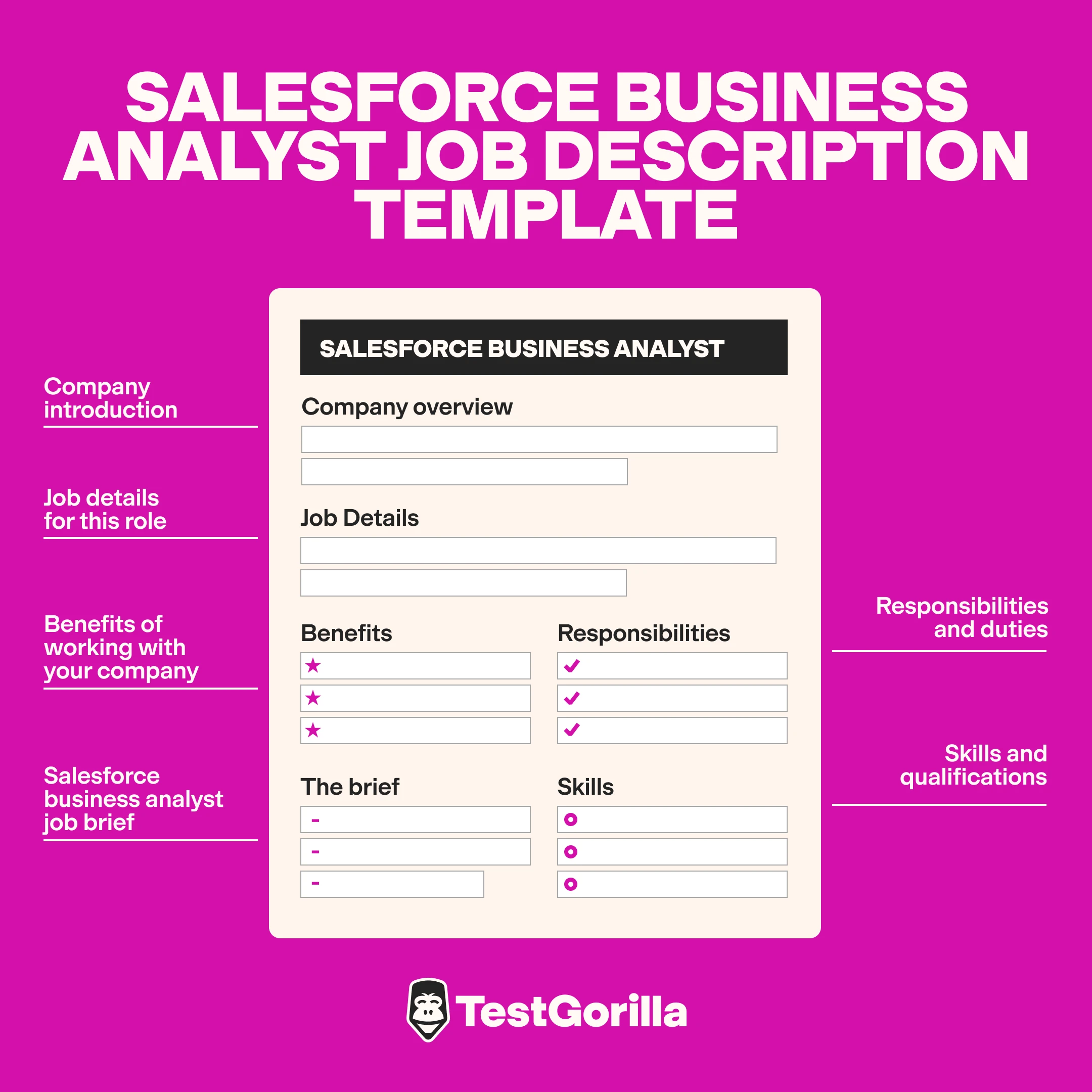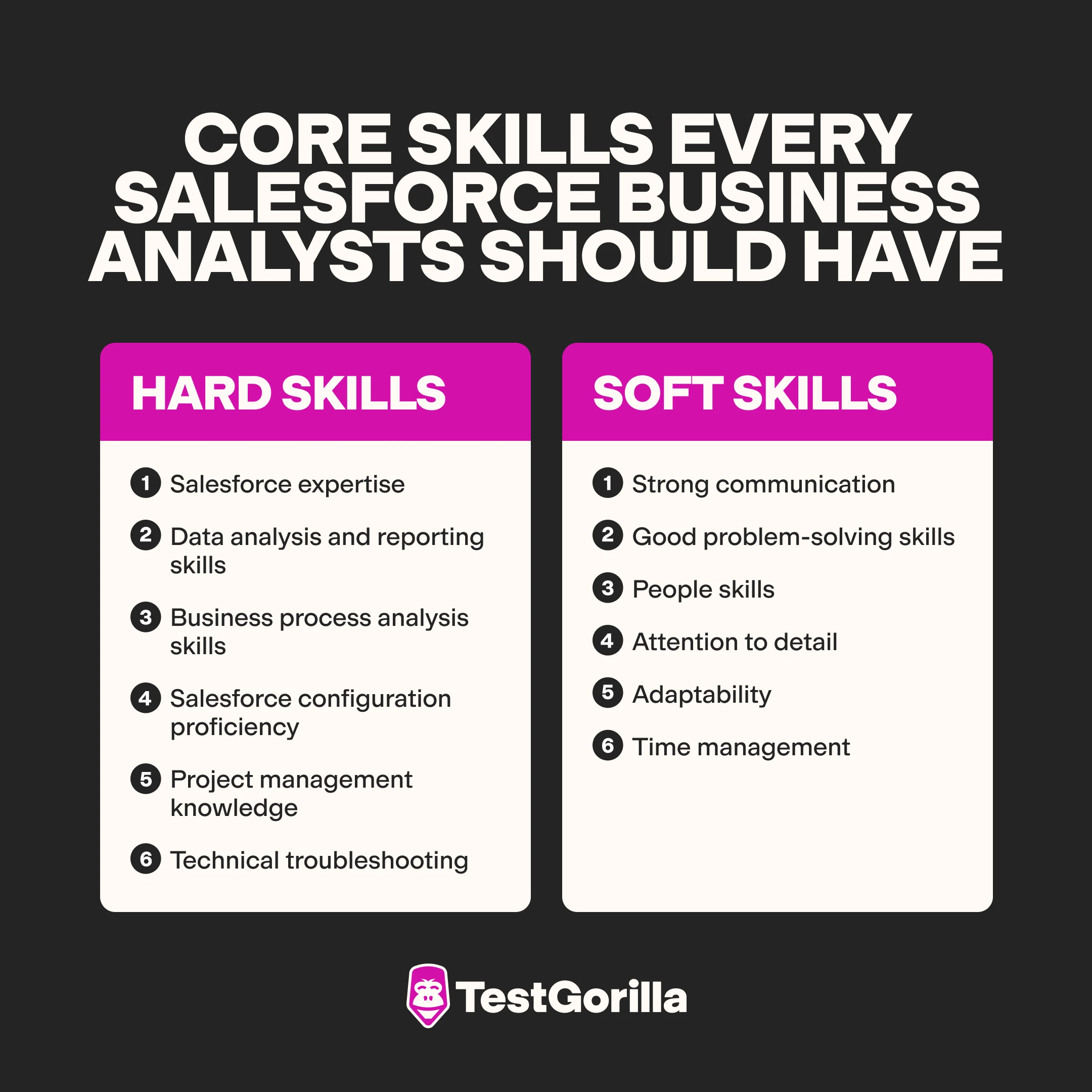Crafting a precise and effective job description is crucial for attracting the right Salesforce Business Analyst for your team. To help you get started, we’ve created a detailed job description template tailored specifically for this role. Use this template to guide you in outlining the responsibilities, qualifications, and skills you’re looking for in a candidate.
Key Takeaways:
Responsibilities: Define what the Salesforce Business Analyst will do day-to-day.
Requirements: Specify the experience, education, and skills needed.
Qualifications: Include certifications and preferred qualifications to attract the best talent.
Company Information: Highlight what makes your company a great place to work.
Salesforce Business Analyst Job Description Template
Company Introduction
At [Your Company Name], we are dedicated to leveraging Salesforce solutions to drive business growth and enhance operational efficiency. We’re looking for a skilled Salesforce Business Analyst to join our team and help us harness the full potential of our Salesforce platform.
Benefits of Working with [Your Company]
[List key benefits, such as health insurance, retirement plans, professional development opportunities, flexible work schedules, etc.]
Job Brief
[Your Company Name] is seeking a talented Salesforce Business Analyst who will be responsible for ensuring that our Salesforce platform meets the needs of our business. You will work closely with stakeholders to gather requirements, design solutions, and implement changes that enhance our Salesforce capabilities.
Job Details
Job Title: Salesforce Business Analyst
Reports to: [Specify the reporting manager or department]
Position Type: [For example, full-time or part-time]
Location: [Remote, hybrid, on-site, address, etc.]
Salary and Benefits: [Include salary range and any benefits details]
Responsibilities and Duties
Gather and analyze business requirements and translate them into Salesforce solutions.
Develop and maintain Salesforce dashboards, reports, and workflows.
Collaborate with stakeholders to design and implement Salesforce solutions.
Conduct user training sessions and provide ongoing support.
Monitor and manage data integrity within the Salesforce platform.
Assist in the design and implementation of system integrations with Salesforce.
Participate in project planning and provide status updates to project managers.
Troubleshoot and resolve Salesforce issues and bugs.
Ensure compliance with data governance policies and best practices.
Skills and Qualifications
Required Skills and Experience:
Bachelor’s degree in Business, Information Technology, or related field.
Minimum of [X] years of experience as a Salesforce Business Analyst or in a similar role.
Proficiency in Salesforce platform, including Sales Cloud, Service Cloud, and Marketing Cloud.
Strong understanding of Salesforce best practices and functionality.
Experience with Salesforce Lightning and Apex.
Excellent problem-solving skills and attention to detail.
Strong communication and interpersonal skills.
Ability to work independently and as part of a team.
Preferred Skills and Experience:
Salesforce certifications (e.g., Salesforce Certified Administrator, Salesforce Certified Advanced Administrator).
Experience with Salesforce integrations and third-party applications.
Knowledge of Agile project management methodologies.
Experience with data migration and data management tools.
Familiarity with Salesforce Einstein Analytics.
Application Process
Interested candidates should send their resume and cover letter to [email address] by [application deadline]. Please include “Salesforce Business Analyst Application” in the subject line.
Feel free to customize this template to fit the specific needs of your organization. By clearly defining the responsibilities, qualifications, and skills required for the Salesforce Business Analyst role, you’ll be better positioned to attract qualified candidates who can drive success for your Salesforce initiatives.
Table of contents
- What is a Salesforce business analyst?
- Key skills to look for in Salesforce business analysts
- How to write an effective Salesforce business analyst job description
- 3 things to avoid when writing a job description for Salesforce business analysts
- Next steps: Attracting and assessing Salesforce business analyst candidates
- FAQs
- Hire Salesforce BA candidates with TestGorilla
What is a Salesforce business analyst?
A Salesforce business analyst (or Salesforce BA) is the person who ensures your Salesforce customer relationship management (CRM) tool is working optimally for your business.
Salesforce BAs collaborate with different departments and use their expertise in Salesforce to analyze what your business needs and customize the platform to make your work processes easier and more effective. To this end, they create reports and dashboards, ensuring their solutions can achieve your business’s goals.
Salesforce Business Analysts also provide training and support to end-users to make sure they’re using the platform effectively.
Key skills to look for in Salesforce business analysts
Here are some key skills all Salesforce Business Analyst candidates should have:
Hard skills
Salesforce expertise to understand the platform and various tools and functionalities like Salesforce Lightning, Visualforce, and Apex.
Data analysis and reporting skills for creating reports and making data-driven decisions.
Business process analysis skills to help them pinpoint areas for improvement in your business processes.
Salesforce configuration proficiency for creating custom objects, fields, workflows, and validation rules in Salesforce.
Project management knowledge so they can plan, execute, and oversee Salesforce projects from start to finish.
Technical troubleshooting to diagnose and resolve technical issues in Salesforce.
Soft skills
Strong communication to break down technical information to non-technical users and ensure everyone’s on the same page.
Good problem-solving skills to identify issues, develop solutions, and implement them.
People skills so they’ll gel well with different teams and stakeholders.
Attention to detail to make sure they're setting up Salesforce and handling data properly.
Adaptability to move with your changing business needs and technology updates.
Time management for executing several projects at once.
The best insights on HR and recruitment, delivered to your inbox.
Biweekly updates. No spam. Unsubscribe any time.
How to write an effective Salesforce business analyst job description
Follow these three best practices when writing your job description so you can snag top Salesforce BA candidates.
Highlight the role's impact on business processes
Show candidates how important their role is in improving business processes and efficiency.
Example: "As our Salesforce Business Analyst, you’ll lead the charge in making our business processes better and more efficient. You'll analyze workflows, find areas for improvement, and implement solutions. Your work will directly help us serve customers better and hit our business goals."
Show off your company culture
Share what it’s like to work at your company. Highlight your values and culture to make the job description more relatable.
Example: At [Company Name], we’re all about fostering a collaborative and innovative culture. As a Salesforce Business Analyst, you’ll be part of a dynamic team that values continuous learning, diversity, and teamwork. We believe in respect, inclusivity, and supporting each other to achieve our goals. If you thrive in a supportive environment and are passionate about making a difference with Salesforce, you'll fit right in with us.
Ask for Salesforce certs and relevant work experience
Clearly state the required Salesforce certifications and experience to ensure candidates have the necessary skills.
Example: "We’re looking for someone with Salesforce Certified Business Analyst or Administrator certs and at least three years of hands-on experience with Salesforce Lightning and other Salesforce tools."
3 things to avoid when writing a job description for Salesforce business analysts
When writing a job description for a Salesforce business analyst, there are some things you’ll want to steer clear of to avoid scaring off top candidates.
1. Don’t be too vague
Don’t just say “experience with Salesforce.” Be specific about which tools and skills are needed, like Salesforce Lightning or workflow automation. Research shows that job descriptions with clear requirements attract 30% more qualified applicants.
2. Skip the overly technical jargon
Sure, it’s a technical role, but filling the description with too much jargon can turn people off. Keep it simple and relatable. Say “you’ll customize Salesforce to fit our needs” instead of “you’ll engage in SFDC customization.”
3. Avoid generic benefits
Saying “we offer great benefits” is too generic. Be specific about what you offer, like flexible hours, remote work options, or unique perks that make your company stand out. This makes your job description more appealing and shows that you value your employees.
Next steps: Attracting and assessing Salesforce business analyst candidates
Once you’ve ironed out the details for your job description, publish it online on social media and job boards like ours. When you start reeling in applicants, it’s time to kick off the assessment process.
But how will you know which candidates are suitable for the role? The answer: pre-employment testing using a platform like TestGorilla.
At TestGorilla, we help you evaluate candidates using a skills-based hiring approach instead of relying on impressive resumes and tricky Salesforce interview questions. In our test library, you’ll find over 350+ research-backed skills assessments that will help you identify true talent bias-free.
Here are a few tests from our library you can use to assess Salesforce business analysts:
Combine these with the Salesforce CRM test and TestGorilla’s Culture add test to spot Salesforce BA candidates who have the know-how and people skills you need for your team.
FAQs
People also ask these questions about Salesforce business analysts.
How long does it take to become a Salesforce business analyst?
Becoming a Salesforce business analyst typically takes around 6-12 months. This includes gaining relevant experience, earning Salesforce certifications, and developing expertise in business analysis and the Salesforce platform.
What is the difference between a Salesforce admin and Salesforce business analyst?
A Salesforce admin focuses on the daily maintenance, configuration, and support of the Salesforce platform. They manage user accounts, set up workflows, and ensure the system runs smoothly.
A Salesforce business analyst, however, focuses on analyzing business needs and customizing Salesforce to meet those needs. They gather requirements, design solutions, and ensure the platform aligns with business goals. Essentially, admins handle the "how" of Salesforce, while business analysts handle the "why" and "what."
Hire Salesforce BA candidates with TestGorilla
The best way to attract Salesforce business analyst candidates is by writing a compelling job description. An effective Salesforce BA job description will be specific about the skills and qualifications you’re looking for, while positioning your organization as the ideal place to work.
As the applications roll in, you’ll need to assess candidates beyond their resumes. TestGorilla’s test library offers more than 400 pre-employment tests to quickly assess their skills, with instant results that you can compare at a glance. Want to take your hiring game to the next level? Get started with TestGorilla today by requesting a free live demo or signing up for our free plan.
You've scrolled this far
Why not try TestGorilla for free, and see what happens when you put skills first.




















